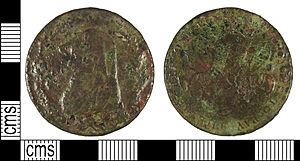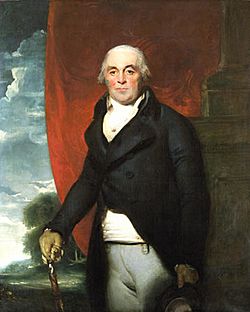Thomas Williams of Llanidan facts for kids
Thomas Williams (born May 13, 1737 – died November 30, 1802) was a very successful businessman from Wales. He was also a Member of Parliament, which means he helped make laws for the country. When he passed away, he was known as the wealthiest person in Wales!
Contents
Early Life and Business
Thomas Williams was born in Llanidan, a place in Anglesey, Wales. His father was Owen Williams.
In the 1700s, it was hard for many working people to find enough food. Thomas Williams was sometimes called Twm Chwarae Teg by his Welsh-speaking workers, which means "Tom Fairplay." He once complained that people were taking turnips from his fields. These turnips were meant for his cattle, but families were using them to eat.
The "Copper King"
Thomas Williams was a very strong and determined businessman. A rival, Matthew Boulton, called him the "copper king." This was because Williams became incredibly powerful in the copper business. Boulton also said that Williams was a very tough negotiator. He would make sure he got the best deals possible.

Williams showed his strong legal skills when he helped the Hughes family. They were in a big disagreement with Sir Nicholas Bayly about the Parys Mountain copper mine. This argument lasted for over nine years! It involved complicated legal terms and a lot of time in court. The dispute was finally settled in 1778.
After this, Williams became the main manager of the Parys Mine Company. He worked with the Revd Edward Hughes and John Dawes. Under Williams's leadership, the mine was cheap to run and produced a lot of copper.
Building a Copper Empire
Williams's main challenge was to get a good price for his copper. Other copper companies worked together to buy copper cheaply and sell it for a lot of money. Williams decided to build his own places to process copper. He quickly teamed up with John Mackay to build a large industrial area near St Helens in England.
He also built warehouses and factories to make copper products. He even had a place to make coins! This meant he controlled every step of the copper business, from mining to selling. In 1788, Williams bought Temple Mills in Bisham, England. He built a beautiful house there called Temple House. He used the mills to process copper from his mines in Wales. Later, he became a Member of Parliament for the nearby town of Marlow.
Williams also worked to control or team up with other copper producers, especially mines in Cornwall. He was always the main force behind his businesses. He built a huge company and had many skilled people working for him. His partners included Michael Hughes and The Earl of Uxbridge.
Smart Business Strategies
Williams was very good at organizing his businesses. He created separate companies for different parts of his operations. For example, the Parys Mine Company handled its own copper processing in South Wales and England. It also made copper products in places like Holywell.
Another mine, Mona, had its copper processed by the Stanley Company. Other companies dealt with making products, chemical works, warehousing, and even banking.
Williams built copper factories in Flint and Penclawdd. Here, he made copper and brass items. Many of these items were used for trade in Africa. These copper goods were sent to Africa as payment for other goods. The money from these trades was then used to buy products to bring back to Britain.
Williams said he invested a lot of money in this trade. He even spoke to Parliament in 1788 when they were discussing a law about ships carrying goods. Williams also helped introduce copper bolts to attach copper sheets to navy ships. He supplied copper for ships involved in naval conflicts.
When he died in 1802, about 1,200 people worked in his Parys and Mona mines. Five years later, this number dropped to 120. This was partly because copper prices fell. It was also because the known copper in the area was running out. But a big reason was that the company lost its amazing leader.
Thomas Williams was also the High Sheriff of Anglesey from 1790 to 1791.
Family Life
Thomas Williams married Catherine Lloyd around 1763. She was from Anglesey. They had two sons and three daughters together.
See also
- Oxford Dictionary of National Biography article by J. R. Harris, Williams, Thomas (1737–1802) revised May 2005 [1] accessed 21 November 2006]
| Parliament of Great Britain (1707–1800) | ||
|---|---|---|
| Preceded by William Clayton Thomas Rich |
Member of Parliament for Great Marlow 1790–1800 |
Succeeded by Parliament of the United Kingdom |
| Parliament of the United Kingdom (1801–present) | ||
| Preceded by Parliament of Great Britain |
Member of Parliament for Great Marlow 1801–1802 |
Succeeded by Pascoe Grenfell Owen Williams |
 | Claudette Colvin |
 | Myrlie Evers-Williams |
 | Alberta Odell Jones |


